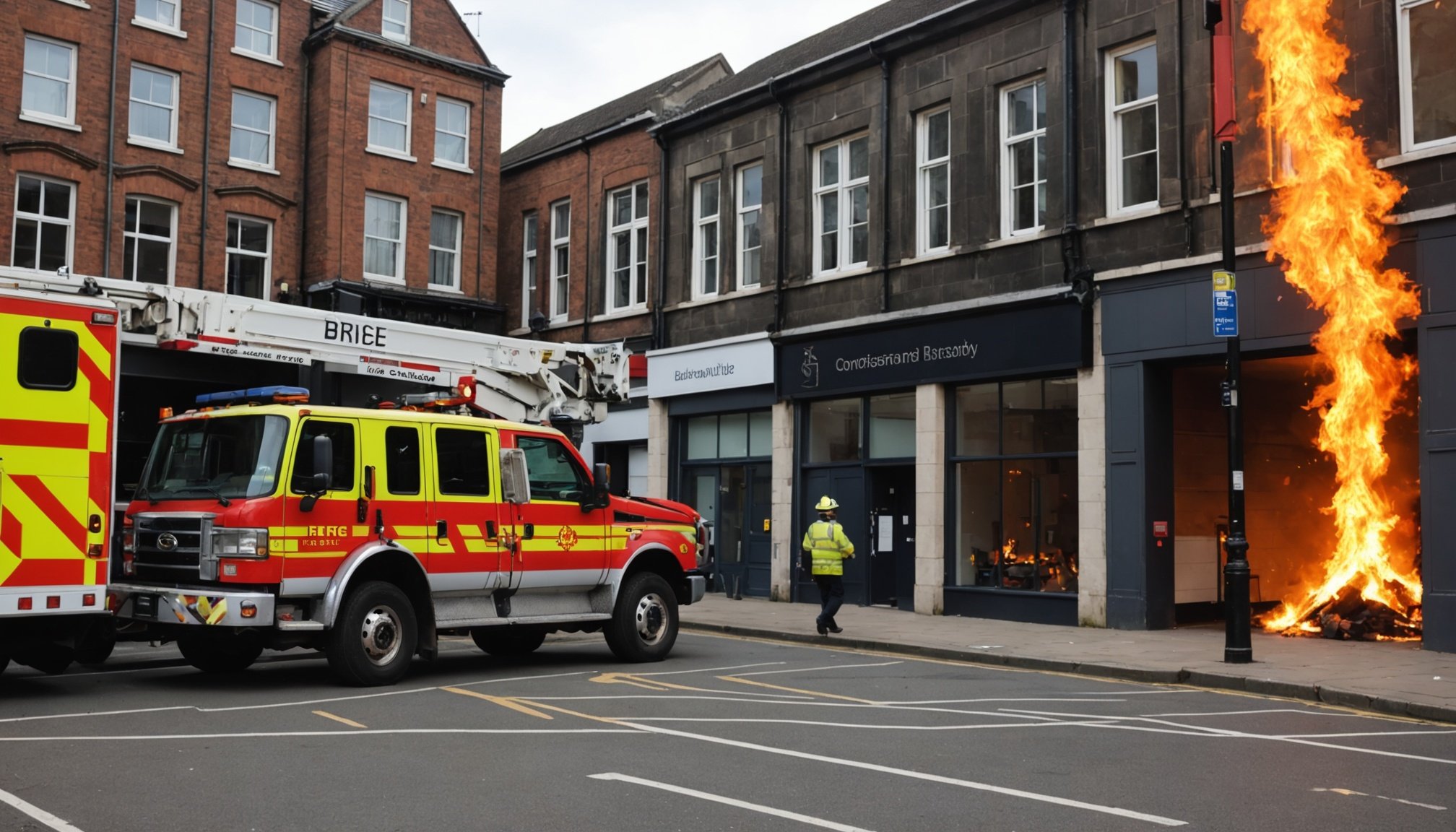Overview of Fire Safety Strategies in Bristol
Understanding and implementing effective fire safety strategies is crucial for both safety and financial considerations in Bristol. By adhering to robust fire safety practices, individuals and businesses can experience significant insurance premium reductions. This is because insurers often assess risk levels based on the fire safety measures established within a property, rewarding lower-risk profiles with reduced rates.
Key Fire Safety Strategies
In Bristol, several fire safety strategies are recommended to enhance protection and regulate costs. These include the installation of smoke detectors, sprinkler systems, and fire extinguishers. Regular maintenance and checks ensure these devices function correctly, maintaining the safety of the premises and potentially reducing insurance premiums.
Lire également : Navigating the Mortgage Maze: Selecting Fixed vs. Variable Rates for Luxury Properties in Edinburgh
Local Fire Regulations
Bristol fire regulations play a significant role in shaping these strategies. Local laws mandate specific safety measures, such as regular fire drills and the presence of visible emergency exits. Compliance with these regulations is not only legally required but also contributes to minimizing risk and thus affects insurance evaluations positively.
By integrating these strategies, Bristol residents and businesses can effectively enhance safety and potentially benefit from cost savings. Being proactive about fire safety not only aligns with Bristol’s fire regulations but also supports long-term economic benefits by reducing insurance-related expenses.
Sujet a lire : Assessing Insurance Requirements for Distinctive Properties: A Guide to Covering Unique Architectural Designs
Analyzing Targeted Fire Safety Strategies
Targeted fire safety strategies involve personalized plans that address specific fire risks within a given environment. By identifying unique hazards and vulnerabilities, interventions can be precisely tailored to prevent fires effectively. Conducting comprehensive risk assessments is central to this approach, serving as the foundation for developing a tailored fire safety plan.
Conducting Risk Assessments
Risk assessments in fire safety pinpoint potential fire sources and the likelihood of occurrence. By scrutinizing factors like building layout, materials in use, and existing fire protection systems, a detailed picture of the fire risk landscape is created. This knowledge enables fire professionals to craft targeted risk mitigation solutions, ensuring the greatest impact with available resources.
Importance of Preventive Measures
Preventive measures are vital components of a targeted fire safety strategy. These measures, ranging from installing fire alarms and sprinklers to conducting regular fire drills, directly tackle identified risks, reducing the chances of fire incidents. Effective prevention not only saves property but also, importantly, safeguards human lives.
Implementing targeted fire safety strategies requires a balanced blend of risk assessments and preventive measures. By focusing on specific fire risks, these strategies provide a robust defense against fire dangers. Adopting such approaches can significantly enhance fire safety and ensure a more secure environment.
Case Studies: Success Stories in Bristol
Exploring fire safety success stories within Bristol offers valuable insights for both residents and businesses. These case studies highlight the tangible benefits of adopting advanced fire safety measures, including a direct impact on insurance costs.
Residential Implementations
One notable Bristol case study features a homeowner who successfully reduced their insurance premiums by integrating innovative fire safety solutions. This home was equipped with state-of-the-art smoke detection systems and automated alert mechanisms, resulting in enhanced safety protocols. The financial impact was significant, with a noticeable decrease in insurance payments due to the reduced risk of fire-related damage. Such strategies not only safeguard properties but also serve as lucrative ventures by lowering ongoing costs.
Commercial Implementations
In the commercial realm, a local business in Bristol reaped the rewards of heightened fire safety measures. By installing a comprehensive fire alarm and suppression system, the enterprise experienced a remarkable shift in insurance costs. A detailed comparison of premiums before and after implementing these measures underscores the substantial savings achieved. Notably, this case illustrates how investing in commercial fire safety systems provides long-term benefits, offering peace of mind through risk mitigation and financial incentives. These examples underscore the importance of proactive fire safety strategies for reducing both fire hazards and associated insurance expenses.
Practical Tips for Homeowners and Business Owners
Navigating the complexities of fire safety can be daunting for both homeowners and business owners. Practical fire safety tips play a crucial role in preventing incidents and ensuring everyone’s safety. For homeowners in Bristol, it is advisable to install smoke alarms on each floor and test them monthly. Additionally, maintaining clear escape routes can save precious time during an emergency.
For local businesses, implementing comprehensive business safety measures is essential. This includes developing an evacuation plan and conducting regular fire drills to familiarise employees with procedures. Ensuring all electrical installations are up to standard and regularly checked can significantly reduce fire risks. Furthermore, equipping premises with adequate fire extinguishers and clear signage underscores the importance of readiness in crises.
Regular fire safety audits are indispensable for both homes and businesses. Homeowners should periodically check that fire alarms are functional and extinguishers are accessible. Similarly, businesses benefit from systematic safety audits, which help identify potential hazards before they become problematic.
Adapting and maintaining these guidelines not only facilitates compliance with safety regulations but also protects valuable assets and lives. By integrating these practices, homeowners and business owners can effectively enhance their safety protocols and promote a secure environment.
Expert Opinions and Testimonials
Understanding fire safety from a comprehensive viewpoint often requires insights from those well-versed in the field. Fire safety experts emphasize the importance of proactive measures. Their consensus suggests regular maintenance of fire alarms and extinguishers as vital components in preventing tragedies. Notably, these experts advocate for fire safety education, highlighting that awareness significantly reduces risks.
Perspectives from Local Residents
Local residents and business owners provide invaluable testimonials on the effectiveness of safety practices. Many recount how adherence to expert-guided strategies not only safeguarded their properties but also enhanced community resilience. Some businesses, for instance, implemented fire drills and contingency plans, sharing positive experiences about operational continuity post-incident.
The Contribution of Insurance Professionals
Insurance professionals play a pivotal role in promoting fire safety measures. They evaluate risks and encourage compliance with safety regulations. By offering tailored insurance plans, they incentivize property owners to adopt preventative strategies. Their assessments often lead to reduced premiums for those actively maintaining high safety standards. Furthermore, they provide vital advice on recovery processes, making them key allies in post-crisis scenarios.
In combining input from fire safety experts, the practical wisdom of residents, and the financial acumen of insurance professionals, communities can craft robust fire safety protocols, ensuring enhanced protection and peace of mind.
Conclusion: The Financial Benefits of Fire Safety
Effective fire safety measures offer substantial financial benefits for both individuals and communities. Implementing comprehensive fire safety strategies can lead to a significant reduction in insurance costs. Insurance companies often provide reduced premiums for buildings equipped with advanced fire suppression systems and detectors. This incentive encourages property owners to invest in safety, effectively decreasing potential insurance claims and fostering safer environments.
An investment in safety not only protects lives but also yields long-term financial gains. Preventing fires reduces the likelihood of costly repairs, safeguarding property values over time. By investing in modern fire-resistant materials and technologies, individuals and businesses can ensure better protection against fire damage, further diminishing unexpected expenses.
On a broader scale, enhanced fire safety measures can benefit entire communities. By reducing the frequency and severity of fires, communities can allocate fewer resources to emergency responses, lowering the taxpayer burden. Additionally, investing in community-wide fire safety initiatives encourages community resilience and cohesion, as residents work together to maintain a safe living environment. This collective effort not only leads to a safer community but also strengthens its economic stability by attracting new residents and businesses seeking secure, well-protected areas.











